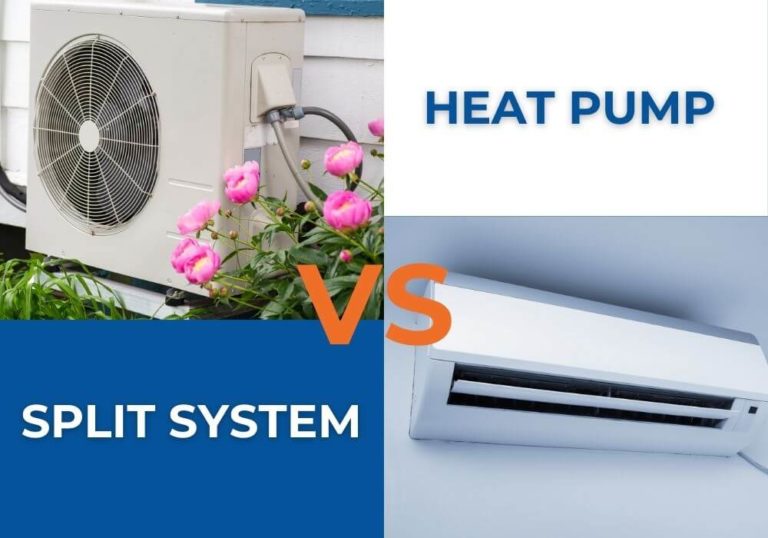It is helpful to know whether you have a heat pump or an AC and gas furnace combination, known as a “split system.” Before we get into the specifics, it’s important to understand heat pump vs split system. This is true whether you’re thinking about getting a new heat pump or a split system AC unit and want to know your options, or if you’re just curious about your current system.
In fact, many homeowners explore a dual fuel HVAC system to combine the benefits of both setups, particularly when looking for the best HVAC system for the North Carolina climate, which often calls for both cooling in the summer and supplemental heat in the winter.
What Do You Own?
You won’t be able to tell if you have a heat pump or a split system by looking at the outside unit. The units appear identical from the outside. You can find differences in your home’s crawl area, attic, or possibly a utility closet.
You may determine what kind of unit you have in three different ways:
A gas bill: You may not have a heat pump if you pay gas bills because you are more likely to have a gas furnace.
Certain electronics and pipes: You have a gas furnace if you notice black iron or copper gas pipes and a flue pipe made of either CPVC plastic white pipes or galvanized circular metal piping when you look at your interior unit.
Emergency and/or auxiliary heating settings are available on your thermostat: You do have a heat pump if your thermostat has emergency and/or auxiliary (often called aux) heating settings. Heat pumps are equipped with auxiliary heating coils to help cool the air during colder months. When your outdoor unit malfunctions, these coils are also used to supply emergency heat.
Heat Pumps: What Are They?
Heat pumps are systems that transfer heat with a small amount of energy from one place to another. Heat pumps raise or lower the temperature to a level suitable for heating or cooling by drawing heat from the earth or air outside and compressing it. Heat pumps can be combined with one or more indoor air handlers in various areas of space to produce a mini-split system, or they can be used in a ducted system, which uses ducts and air vents to distribute heating and cooling across a space, similar to what is a split system heat pump.
Split Systems: What Are They?
The two primary parts of split systems are an indoor unit with the evaporator coil and blower and an outdoor unit with the compressor and condenser. A split system’s zoning features, which let you independently regulate the temperature in several zones or individual rooms, are among its best features. Split systems provide installation flexibility since they may be adjusted to the particular space and layout of your house. Systems can also provide warm or cold air while maintaining a quiet home because they are usually quieter than conventional HVAC systems.
Heat Pump Vs Split System: Differences
Both heat pump vs split systems have advantages as well as disadvantages in terms of cost and energy efficiency. When the temperature rarely falls below freezing, heat pumps are the best option. They work well in moderate areas. Their only source of warmth is ambient heat from the outside air, and they may struggle more than conventional systems in extremely cold weather. Conversely, split systems might be more economical in areas with severe cold or high temperatures and provide better performance in tough weather situations.
In terms of installation and maintenance needs, heat pumps are typically easier and less intrusive, particularly small ductless heat pumps that require less ducting. Despite having zoning possibilities, split systems might be more difficult to install, particularly if you’re installing the heating and cooling system in your current house. Although heat pumps may need more frequent refrigerant checks and filter changes to keep them in effective operating order, maintenance is crucial for both systems to guarantee optimal performance and lifespan.
When deciding which heating and cooling system to install, indoor air quality and noise levels are also crucial factors. Conventional heat pumps are a common heating option for spaces that are sensitive to noise because they are often quieter than HVAC systems. By constantly moving air while transferring heat into your house and filtering out pollutants, heat pumps can also enhance the quality of the air in your house. Split systems provide the optimum air temperature in any room while creating a calmer atmosphere because their indoor air handlers are situated away from living areas. Split systems can also improve the quality of the air by offering sophisticated filtration options.
A heat pump may encounter problems since it produces heat in extremely cold locations, even though both heating and cooling systems are excellent choices. Given that they only require electricity to operate, they are still an excellent option for an air handler in a home without gas. A split system will easily transport heat, but it will use more fuel in your house.
Summary
What is the difference between a heat pump vs split system? A heat pump functions exactly like an air conditioner when it is in cooling mode. Once you switch on your heater in cooler weather, the differences become apparent. Since heat pumps work on electricity rather than gas, they are an excellent choice for families who do not have access to gas.
How do you decide whether or not you have gas on hand? Would a heat pump be a better choice for your household? Or should a split system be taken into account?
Since heat pumps are powered by electricity rather than gas, there isn’t a contained fire in your house. This eliminates the possibility of carbon monoxide (CO) leakage from heat pumps. Gas furnaces from split systems, on the other hand, are a bit warmer, and they can be a safe choice for your family as long as they are tested and repaired every year.
A well-insulated house can be warmed just as well by a professionally installed, appropriately sized heat pump or split system. Both units have comparable cooling and heating costs, however, propane furnaces are substantially more costly to run. A heat pump system is a simple way to replace your propane furnace and save a significant amount of money. You may save hundreds of dollars annually and keep your house just as warm by connecting that to your propane furnace. In extremely cold weather, you can even use your propane furnace as a backup source of heat.



